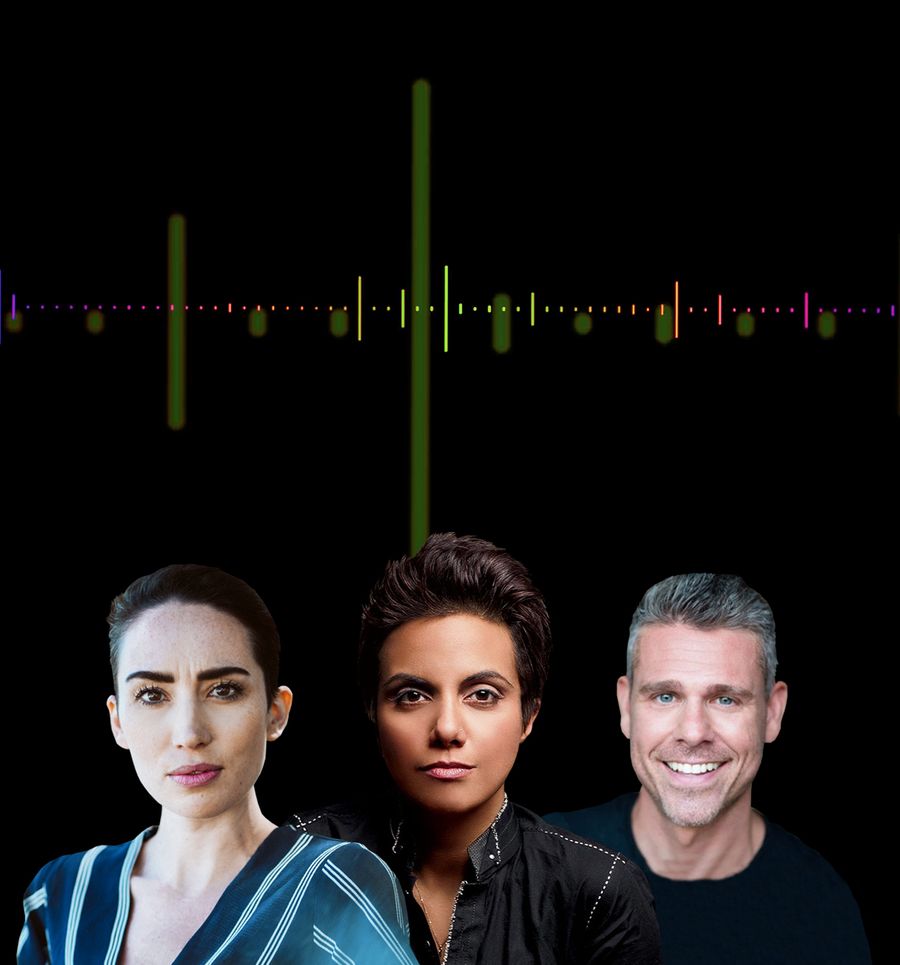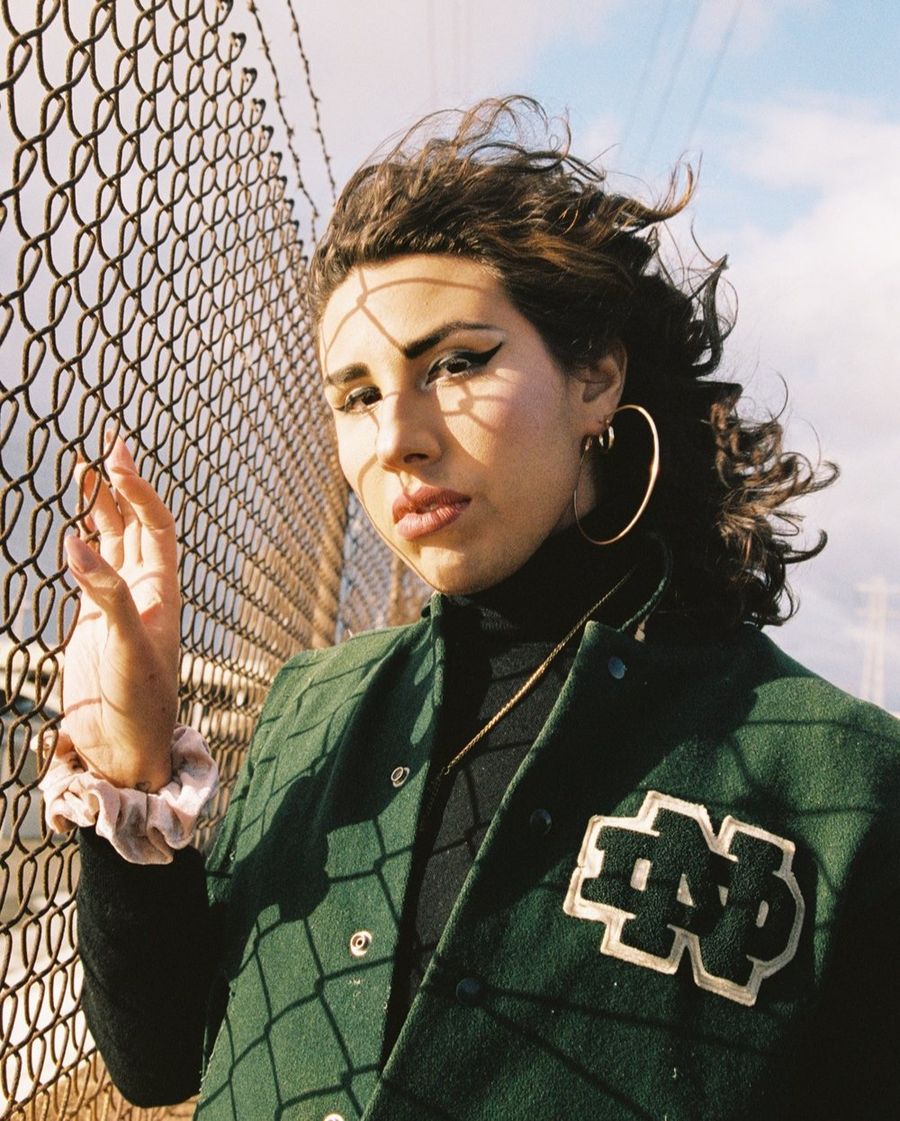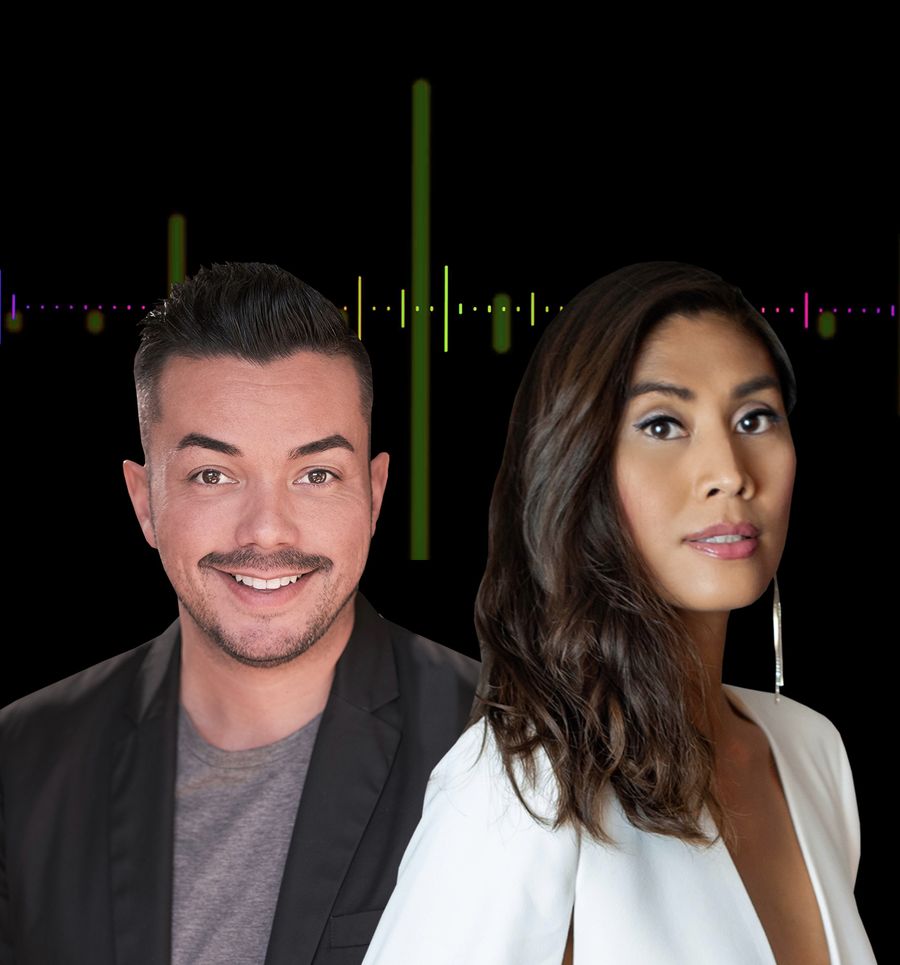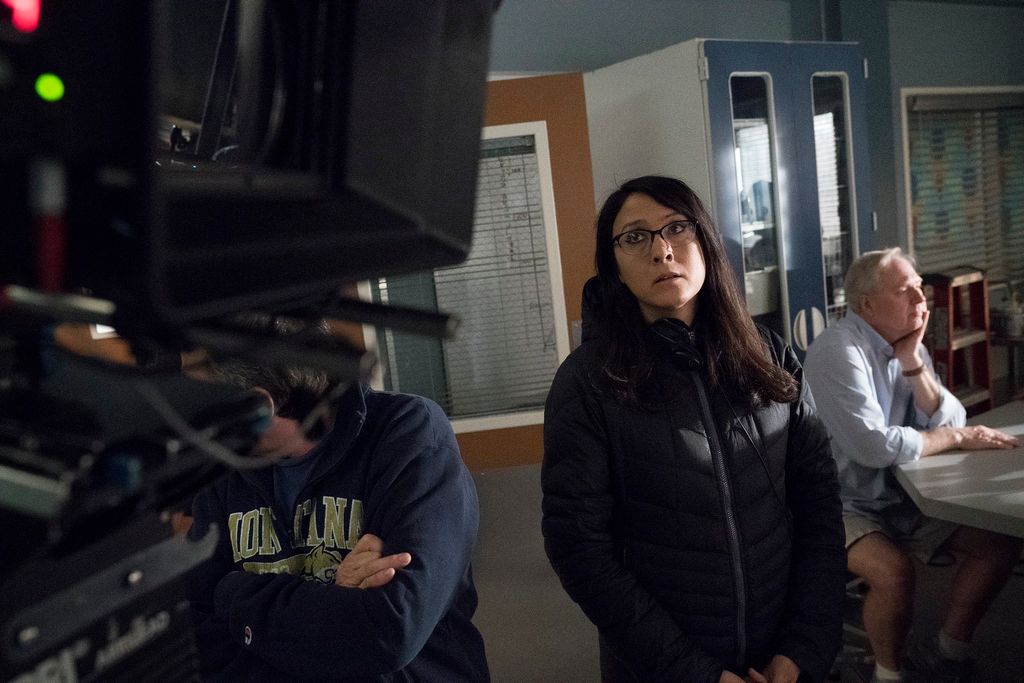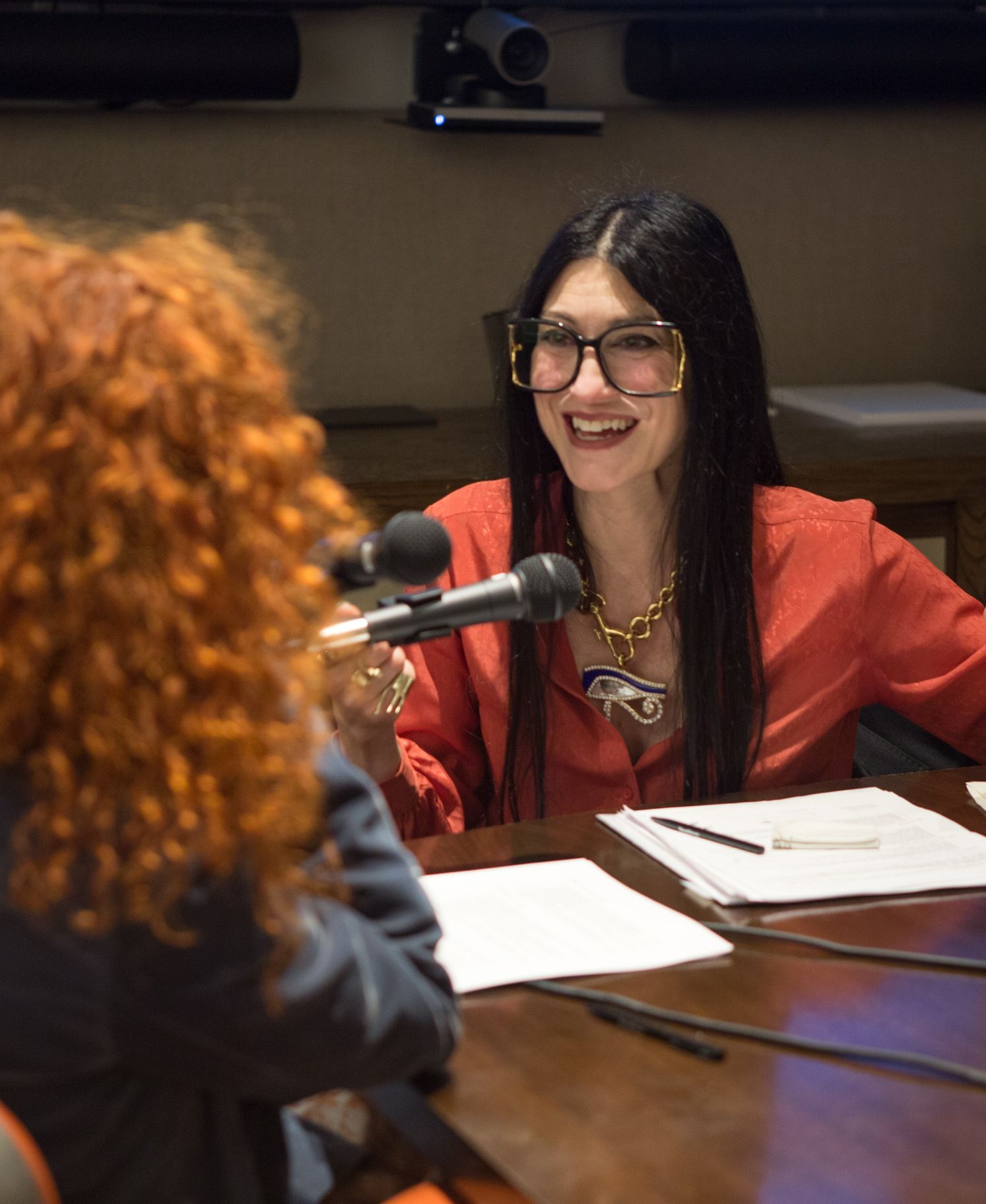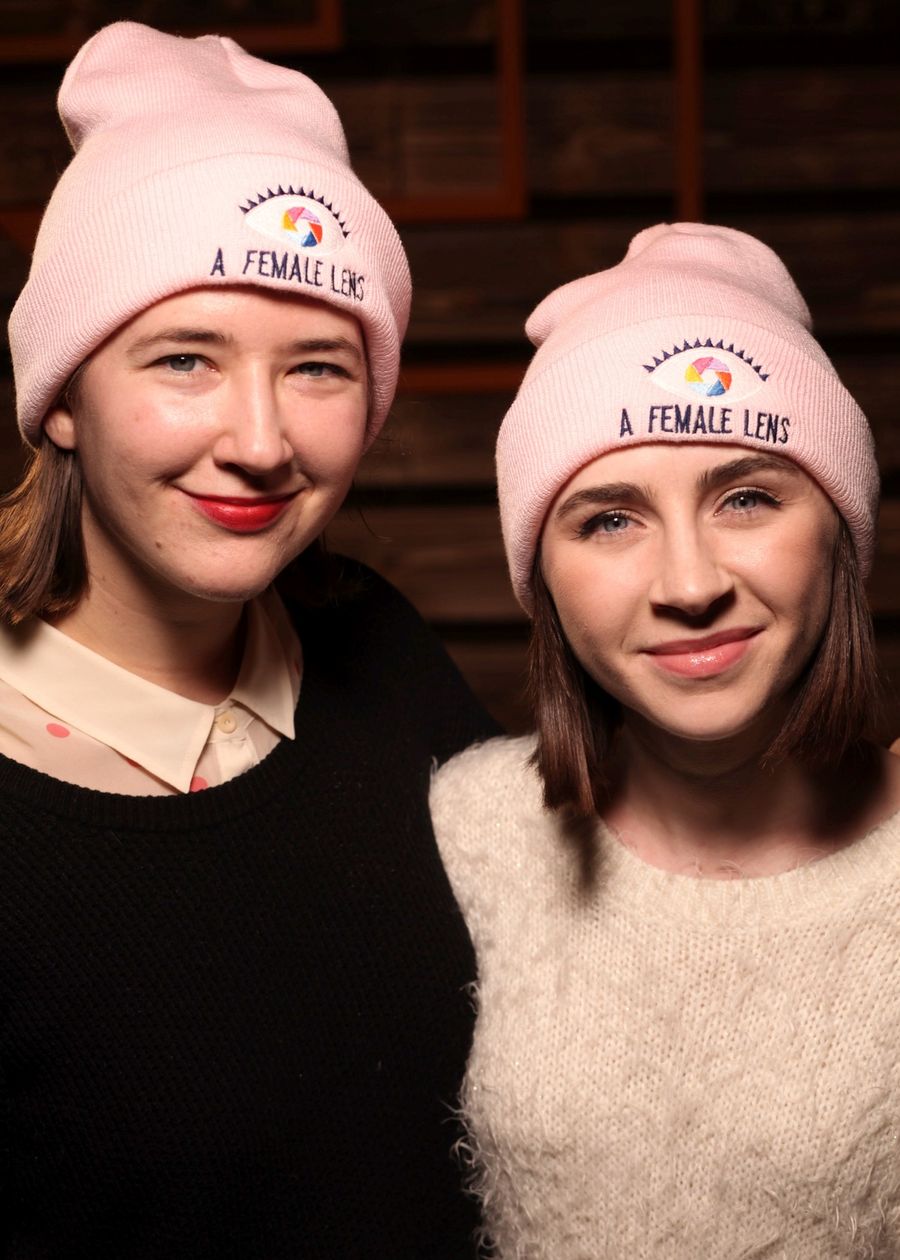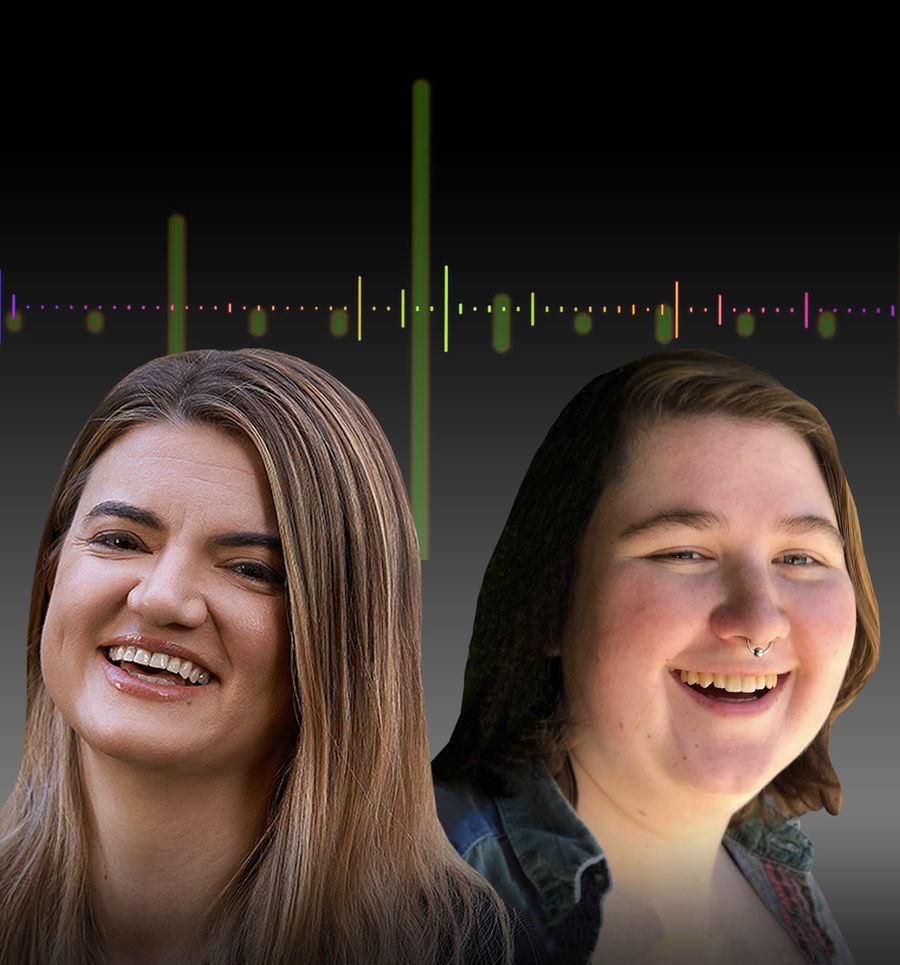On the first episode of "FREE THE WORK Focus: Pride," the FTW podcast mini-series, supported by GLAAD, GLAAD's Director of Entertainment Media Jeremy Blacklow catches up with filmmaker/entertainer Fawzia Mirza and Director of ReFrame, Andria Wilson Mirza. (Yes, the two are married.) Together, they chat about building a supportive LGBTQIA+ creative community, what's missing in queer storytelling, and how their marriage informs their creative collaboration.
Subscribe to the FREE THE WORK podcast on Amazon Music, Apple Podcasts, Spotify, Stitcher, and Soundcloud to listen to this episode and get updates on the next one!
Then be sure to follow @GLAAD and @FREETHEWORK across Twitter, Instagram, and Facebook.
Scroll down for the full transcript of the episode!
Andria Wilson Mirza
Andria is the Director of ReFrame, the gender equity initiative of Sundance Institute and Women In Film. She is currently leading a cohort of producers and executives in launching an industry-wide campaign to mitigate gender and racial bias in hiring practices. From 2016-20, Andria was Executive Director of Inside Out, Canada’s largest LGBTQ film festival. She established the world’s only LGBTQ Feature Financing Forum, launched two development funds, co-founded the North American Queer Festival Alliance (NAQFA), and spearheaded a 4-year partnership between Inside Out and Netflix. Named ‘one of 15 Canadian women to watch’ by the CBC, Andria has been a featured speaker at festivals and conferences including SXSW, TIFF, Sundance, Greece’s Outview, Oslo Fusion, the Iris Prize Producer’s Forum, and Berlin’s European Film Market. With Fawzia Mirza, she founded Baby Daal Productions in 2020, and produced the recent CBC short NOOR; LAYLA.

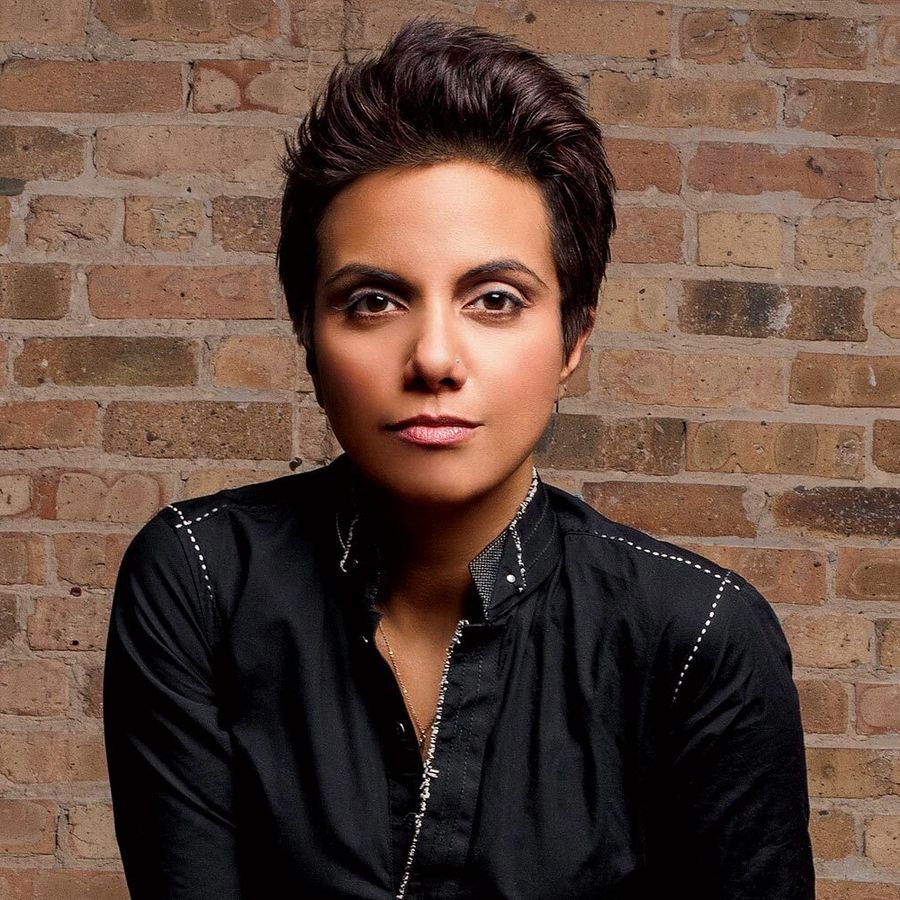
Fawzia Mirza
Fawzia (she/they) is a queer, Muslim, South Asian, Pakistani-Canadian artist: one of Filmmakers to Watch; (Independent Magazine), a White House ‘Champion of Change’ (Asian American Art; Storytelling), a ‘Top 10 Creative’ (Indiewire), an Islamic Scholarship Fund Winner, a ‘Yes And Laughter Lab’ winner; one of five writer/directors in Paul Feig’s FUSE 2021 incubator. Her first feature, SIGNATURE MOVE (co-writer/producer/star), premiered SXSW, screened 150+ festivals, won 14 awards (Outfest Grand Jury Prize, US Narrative). She wrote on CBS’ THE RED LINE (EPs: Greg Berlanti; Ava Duvernay); her episode marked the first queer, Muslim romance on network TV. She wrote/directed shorts I KNOW HER (Palm Springs Shortfest, BFI Flare), NOOR; LAYLA (Provincetown, BlackStar), JIYO (Pakistan’s Olomopolo Media), and directed 2020 Outfest Audience Award-winning-series HIDDEN CANYONS. ME, MY MOM AND SHARMILA is supported by SFFILM, Canada Council for the Arts, TIFF Writer’s Studio; TIFF Filmmakers Lab.
Jeremy Blacklow
Jeremy Blacklow joined GLAAD in 2017 as Director of Entertainment Media, where he serves as a liaison between GLAAD and the film, television, music, and gaming sectors, working to ensure that the industry is equipped to leverage GLAAD’s research and resources to bring about fair, inclusive, accurate, and diverse representations of LGBTQ people and issues. In this role, he provides strategic counsel and manages key campaigns that bring the power of the industry to bear in order to accelerate acceptance for LGBTQ people.
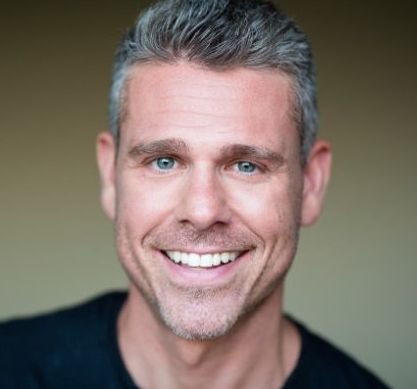
Chloe’s Intro: What’s up world, we’re here with THE FREE THE WORK podcast. With this episode, we’re wrapping up “FREE THE WORK Focus: Pride,” our special mini-series, supported by our friends at GLAAD, spotlighting some of today’s leading LGBTQIA+ creators.
Kicking off the series GLAAD’s Director of Entertainment, Jeremy Blacklow, reconnected with powerhouse creative and real life couple, Andria Wilson Mirza and Fawzia Mirza. Together they talk about Andria's new role as the director of Reframe, Fawzia’s tips on building community through the film festival circuit, and their thoughts on the exciting horizons for LGBTQIA+ storytelling. Enjoy.
Jeremy Blacklow: Hi, everyone, and thank you for joining us for the FREE THE WORK podcast mini series supported by GLAAD if you're just getting familiar, FREE THE WORK is a nonprofit global initiative and searchable talent discovery platform for underrepresented creators. And just a little disclaimer, we got to say the views and opinions of the guests do not necessarily state or reflect those of FREE THE WORK. My name is Jeremy Blacklow; I'm the Director of Entertainment Media GLAAD and today I'm going to be speaking with Andria Wilson Mirza, the new Director of Reframe, and Fawzia Mirza and acclaimed writer, director, actor, and everything in between. Not only have they become friends of mine, but of course through my work with GLAAD, but I'd also be remiss not to mention that this power duo of LGBTQ storytellers are also married to each other. It's such an honor to have them both here today. But I'll let them both jump in and introduce themselves.
Andria Wilson Mirza: So I'm Andria. As Jeremy said, I'm the new Director of Reframe, which is a joint initiative of Sundance and Women in Film, to advance gender equity behind the scenes in Hollywood through a number of exciting initiatives. But I have worked in the queer media space for a long time coming up through the film festival world. I met wonderful people like journey and also like my amazing wife, Fawzia Mirza while working in the LGBTQ Film Festival space. So is that a good segue sounds to you?
Fawzia Mirza: Like I think- Yeah. Thanks, Andria. What's up? Yeah, my name is Fawzia Mirza. And, you know, I used to be a lawyer. And then I started acting and eventually started writing because I didn't see roles. For any one of my identities. I identify as queer Muslim, South Asian, Pakistani, Brown, Indian. She, they, and I'm a new director as well. And, you know, started in the indie space and then moved to LA and started writing for TV and now developing TV and working on features. Definitely committed to putting queer Muslim PSC protagonists out there as often as I can. And also love Jeremy and GLAAD and FREE THE WORK and Tara behind the scenes. I had to say that it's so and I love you too, as this is gonna be such a love fest conversation. And I'm- because every time we always talk, I feel like we all just sort of geek out together about film and queer representation. And we could probably talk for three hours. But I'm so excited to see where this conversation goes. But Andria, first, I just wanted to ask you a little bit more about your new gig, which is brand new, and just tell us a little bit about what you're going to be doing in your new role.
Andria: Honestly Jeremy, I'm so excited about this. Because, you know, I think one of the things that you and I connected on is just being a champion of creatives, right? Being a champion of in particular underrepresented creators, right? They're doing exceptional work, and really looking at the system, looking at all of these structures and what's in place and what serves and what doesn't serve and being able to advocate for artists within that space. And so, this new role, you know, coming off of I was the Executive Director of an LGBT Film Festival for a number of years before moving into this space. You know, this is an advocacy role and it's, you know, it's advocacy around, you know, the systems that our industry is structured within so it's about systemic change. Reframe has a few key programs that are well up and running and established and exciting like the Reframe Stamp which is the mark of distinction that's given to films that meet criteria for gender balance, gender diversity within their crews within their cast. That's a really exciting part of Reframe. There's the Reframe Rise Program, which supports mid career women directors, and includes, you know, some exceptional directors from our community like Sydney, Freeland and Deseret, then, you know, I get incredibly excited in this role about the impact on the large scale, you know, the systemic, but also, as in all of our work, the personal, you know, like, as a queer woman, as an advocate for queer trans people in my life, my love, my work, being able to see impact and create impact with individual artists, and also shake up the system. Like that's what it's all about, you know that that's what I'm so so excited about.
Jeremy: Amazing. Thank you for sharing that with us. And I should add that when I met Andria, she was the Executive Director of Inside Out Toronto's LGBTQ Film Festival. And, we've done so much and I have so many relationships in the queer film festival world. And so what you were talking about when it comes to disrupting systems, I feel like that's gonna probably be a theme of our conversation today, overall. So talking about you going to this idea, and for both, Fawz and Andria, about this idea of the film festival circuit is sort of where I want to start and the role of LGBTQ film festivals in this process in this system, and the role they play in their importance. What's one thing or piece of advice that you would give to a queer filmmaker? Who's entering or even a non queer filmmaker? Who's entering this weird world? That's this film festival circuit? Would you advise people to navigate that?
Andria: You know, it's a great question. And, this is a topic that I feel like I could absolutely talk about for hours on this, because, and I'm excited to hear Fawzia’s thoughts too, because I know her experience coming up through that circuit as well. As a creator, you know, from my side, I think the thing that I really want filmmakers to know is that the people in these spaces are now and will become your champions like film festival directors; people working in that space love discovery, we love getting to know talent in an emerging level, we love seeing your first work your first idea, your first, you know, like, we want to build those relationships with you, we want to see you grow, we want to collaborate with you, we want to find opportunities to connect you with other artists that might, you know, be a great future collaborator for you. So I think one of the scariest things about going into the circuit or or any system where there are dates and gatekeepers is you know, the feeling like they're, you know, they're judging me; this is my work, my art I'm, you know, they have this whole agenda, I'm not going to fit within it, like how do I protect my art and my heart and myself in that space? And I think really looking at these spaces as an opportunity for you to build the relationships is so key and believing that the folks on the other side of the email, they're doing this because they believe in you and they want to help you build your career. And I think in the nice festival space, you know, LGBTQ film festivals, culturally specific film festivals, that is true times a million, because this is not just our work, this is our life. These are our loves, our friendships, our kinship, so I think finding ways to when someone tells you they love your work, believe them, and and see that as a relationship and as an open door and as something that you can continue to nurture and grow as you navigate that that circuit, so you know, seeing that opportunity, I think is key.
Fawzia: Yeah, I mean, I feel like the film festival I mean, Andria has heard me say this so many times, like the film festival world, definitely is where I found a home, a community a place to screen my work in a way that really, I didn't really know where else to go. First of all, you know, I was living in Chicago when I made my first project I really worked on- Ironically, my mom just messaged me about it. And she's like, Fawzia I'm watching it on the Islamic channel right now, because I never worked in film and I worked on this documentary about this Muslim poet alumni ball and the film is called A Message from the East. And I just kind of, you know, went with them to Pakistan because I could speak or do and that was my strength and power and it was a good one. And since- By the way, these guys have, you know, the directors have a very good friend of mine, Jeremiah Hemmerling, you know, then I worked on a film where he was with someone I was dating and, you know, she was like, how do I get someone who's as committed to the task as you? And I said, let's just do it. And so I produced her feature, which went to Outfest. I can't remember now, it might have been 2009, or something like that. But that was also not really being from the film world, but just wanting to tell this queer story with someone who was already doing the work. And then my first short film was OutFest in 2012 that I made with Ryan Logan that I, you know, we collaborated on together with a very personal story, very personal film, The Cleanaway Dreams. And it was when Kim Yutani was still the head programmer at OutFest. And I mean, for me like that, that's the only reason I understood that I had a way in to make movies was OutFest and film festivals. And, you know, eventually, of course, Inside Out and Frameline and the BFSI. And you know, all these other Palm Springs, all these other great festivals, but I didn't even know that that was something I could do. And truthfully, I mean, in 2012, like, I mean, even now it's still a struggle. But in 2012 the mainstream world forgot about the film world. Nobody really was talking about that; there were no queer Muslims on TV.
There's no Queer, Muslim, Brown people, any people there was like a poo and Mindy Kaling those are the Brown people on television. And that was, you know, I mean, you had one of two role models in that duo, right? Like, there's no, no one's like, “Oh, I hope I want to grow, I want to grow up and be Apu.” Like, that just doesn't happen. And he's not even wasn't even voiced by a Brown person. But the film festival space gave me somewhere that it made sense that I was who I was. So so so so for me, I'm a huge advocate of there are spaces for us within the queer Film Festival space, and, of course, the film festival, at large spaces. And I really agree about relationship building. I mean, you know, after being out fast, with my, you know, with that director's feature, I had a relationship with Kim Yutani. And so then, I have nurtured that relationship and was able to connect every single time I wanted to submit something and, you know, yes, you can always submit blindly, and just put it in the pile. And the truth is, I just think that it's harder to get it seen, because it's usually not that decision maker who's seeing your film, if there's 6000 submissions to the festival. So I don't even remember your question anymore. But the point is like there are and here's the other thing, I think, like, you know, when we're thinking about submitting to film festivals, like just at the most basic level, like what's the strategy, of course, we have, all of us, have the dreams of going to Sundance, going into Cannes, or TIFF, or, you know, all of these huge, amazing spaces. And there's always a local festival, there's always a film festival that's, you know, in your city in your town, connected to the identities you're a part of; there's always something that's local that could also be really exciting to help lift you up and elevate your work and your voice. So I always think of having a tiered approach, if you don't want to pay the fee, reach out to people who are there, tell them your heart is up. It never hurts. The worst they can say is no, I know some people, some programmers like it, some people don't. But, you know, when you're trying to make it and you have limited resources, you do what you have to do, you hustle. And one of those hustles is definitely asking for a fee waiver.
Jeremy: That's a good one. Always a good one. And you're usually gonna get it if you ask nicely.
Fawzia: Yeah, right. Like, you know, especially Yeah, and depending especially depending on what the festival is, they're like, oh, okay, you're from, you're from our town or you're from here or whatever. So why not?
Jeremy: So, this year, you helped create sort of an alliance of queer film festivals called knack for the North American queer film Alliance. Um, which leads me to my next question, which is, what's the role of LGBTQ film festivals or other marginalized community niche film festivals in relation to the bigger film festivals, which really many of the ones that we tend to gravitate towards like Sundance and TIFF are doing a better job of programming with very diverse lineups and very inclusive lineups? So what be what do you see as the role of queer and in niche? I don't want to call it a niche. That's almost a misnomer.
Fawzia: We're reclaiming that, we're reclaiming that niche. Exactly, exactly. We're owning that. I mean on it, honestly, I feel and and in my time and Inside Out I really, this was an idea that I began to kind of fall in love with more and more is the idea that I think these festivals are the future like I think the the tentpole festivals, you know, Sundance and tip and the like, are incredibly important for both artists and industry. Without question, we are all in an ecosystem. And those festivals are, you know, a core core part of that ecosystem. And they are doing the work that they are doing in the spaces that they that they are in, but the the niche festivals, the queer festivals are doing a different type of specific community based activism. It's like an intervention within the larger industry. And I think because of that, I would say narrow, but deep focus on the nice festivals were able to really act as advocates and champions for work that even if it may, if it ends up in the spheres of one of these larger festivals, it, you know, may not be the must see gem, you know what I mean? Like we work really actively in that space with, you know, independent films that don't have publicists for an example. Do you know how difficult it is for a festival to get major press, you know, temple film festival? If they can't afford to have a publicist? I mean, of course you do. You know, it's, it's near impossible. And I know God does a lot of that work as well. And with the queer festivals, with the new festivals, something that I've talked about a lot with, with NACA is, you know, what are the ways that we can use our resources to create our own star system to build structures that support this talent, before they may be on the radar of these larger festivals, and then get them in that space. And then we elevate them further. Like for me, when we had a few times in the time that I was inside out where we had shorts that had premiered inside out, which is an amazing festival that ended up in Sundance the following January, That, to me, is a massive win, right? And then that filmmaker starts their relationship with the Sundance Institute, and then continues to have a trajectory. Like, that is amazing. I think it's, it's the role of, like discovery and uplifting. And, you know, for me, I really felt that it's like, what the festivals can do and can continue to do is to have, you know, we all have these anecdotal stories of films that have had this journey. But we also need data and metrics, and to be able to say, this is why it makes sense to build your festival strategy this way, premiere your film here, you know, have this approach. And you know, if your goal is to get your feature film script in the Sundance lab in two years, we can help you towards that goal. And we can work on developing this specific strategy for you and your work and your voice. Because it is an ecosystem, and we're all connected. I think the more festivals understand that and lean into their specific identity, the more they'll continue to be, to be relevant and to be homeless for the filmmakers.
Andria: Absolutely. I agree wholeheartedly and, and, and vice versa. I've seen films at the big festivals, queer films that that premiere at the biggies, like like Sundance or south by or TIFF and they get swallowed up, but then they find second lives on the queer festival circuit and gain momentum that propels them on to bigger and better things, which is, it's so true. Like, you know, you think about how I say this about Fonzie all the time, because she's just an incredible connector of people. And in the old days, when we would be at like in person events, you would always see Fawzia introducing, like one person from one space to like someone else. And like, just, you know, oh, I've just seen this person's film, and they're so amazing. And you have to meet them and like, and all of that, and I think that's what the nice festivals do and what we should do, right? We want to take what we see and what we love and our communities. And then we want to be the, you know, the evangelist for that work in the mainstream spaces and help to propel and, and, you know, in essence, like, drive people towards more opportunity, you know, career wise, to, you know, help them financially like all of those things. We really want success for them and whatever that might look like to them.
Fawzia: Also, the other thing is that, you know, it's there's community, there's community that I only see at certain festivals in certain parts of the world. And, and part of it is also because that's where those filmmakers get to. And I do think there's a global way of thinking about this, you know, instead of just an American centric way of thinking about these spaces, you know, I mean, it's European film is so different Asian film is so different and, and though none of those films might make it to, to certain big festivals, or even certain niche festivals. And so, you know, it's like, how do you find all of these other amazing works happening in the world?
Jeremy: And I want to continue that conversation about the community that you just touched on. And Andria, you were talking about how your amazing wife is so good at connecting people and introducing people. And I've certainly watched her in action. I mean, she's invited me to table reads of projects about the pandemic, and I've seen her and action bringing people together. So Fawzia, how have you created the creative community around yourself? been a part of your career? And how is creating? I feel like you're somebody who just brings people you know, like your wife says, brings, you bring people together? And how has that creative community inspired you and driven your work?
Andria: I mean, I am a collaborator. So my, my, my strength is collaboration, my power is in collaboration, both as an artist, but also as a friend. And as a partner, as a wife. I mean, that's as a husband, whatever, you know, I'm cool with both. That's where my strength lies. And the thing that I really am committed to is, I don't have to be the number one, in order for us all to do it. Well. I mean, even as I moved into directing, the thing that I am embracing is that I don't want this to be a top down production. And I definitely don't think I have all the good ideas, because that is far from true. My best ideas come from being sparked by someone else smarter than me on the team. And that is the thing that I am grounding in and that I am moving forward with. Have I always been as clear-sighted about that? No way. Have I often, you know, have made decisions that I think about? I'm like, you know, I could have done that differently? Of course I do. Or could I have, you know, acted quicker? Could I have just made it better to sit? Yeah, of course. But, but I think like, the thing that I'm realizing is that collaboration is everything. And every one of my projects is proof of that every single one from the first short film, which was very personal, but like I could not have made it without, you know, queer director, writer, Ryan Logan, who just made it as beautiful as it was. But you know, and to me, the collaboration is not just the people who are making the film, it's all of the the community around us, the people who believe in us, I mean, Andria, and I met at her festival inside out at inside out, and is now not just my wife, but like, one of my creative partners. I mean, I don't I don't write anything that she doesn't look at. And in fact, we've been making, you know, developing my next feature, and she's one of the producers on it, and community is essential. You know, what can you trust? And who can you trust? And who can you be really vulnerable around? I think that I'm a Pisces, I have a lot of feelings. And I need to know that I can be vulnerable about those feelings in a way that's not conveying that I don't know how to make decisions, you know, so I, I need, I need to I need and, and, you know, one of my goals is definitely to, to uplift some of those younger queer creators around me as well. And I, you know, I mean, I think Andria is, one of the things that I've always told people about Andria is that, you know, so many people, including myself, like there's ego involved in the work, there just is, even when we try to remove it. One of the things I promise is not lip service, I'm really, I'm really trying to remove my ego from the work so that I can move forward with the work being the number one, which means I can listen and receive from all my collaborators better. I'll make the decisions as the director, I'll be clear, but I want to take out more of that ego. I think that transcends me and helps me be a better person and a better creator. And that's an Andria Wow. Let me tell you your heart a little bit. What I love about her is that for her, there's no ego. For herself, the success is when she helps the filmmaker get the financing. Like truly, when she can say, Oh my god, I found, I helped you, connect you to an actor, your dream actor for your project, or this executive loves you so much, and wants to take a meeting with you and talk about your work. You know, I just think that's, that's, that's one of her gifts. And it's, I just can't wait for more people to be championed by her.
Jeremy: Well, one thing I want to say to that as well, Fawz and thank you for that, that's so beautiful but you know, I think we have to, like examine our relationship with these systems, right, especially as queer people, I think, coming into, you know, spaces that were built in a way that wasn't meant to include you, right. And so often that ego and that idea of rewarding ego within this industry, like it's, it's just, that was never a space for us, you know, so I think we have to consider how we are decolonizing the spaces we're in how we are shifting that narrative around, rewarding and centering a brilliant project by a singular creator, and instead like, embrace the collective, the collective process the community, I think that's a shift that's about like, you know, really queering the, the system and the medium and not just seeing hot gay make outs on screen, which is amazing. But like, what was on the other side of that lens? And what was that work environment like, for people? Was that a safe space for queer and trans people? Like, who's holding that camera?
Andria: You know, I just think it's like interrogating all of those things, and embracing and lifting up our community in all of those ways. And I get excited, as I'm seeing, like, more and more of that more talk about the process and demystification of the process, you know, we can all do this, we can all collaborate and, you know, Fawzia and I made a short together during the pandemic, that she wrote and directed, and we shot in Toronto within like all queer, mostly, like, queer women of color behind the camera, crew, you know, and and did it all COVID compliance, and it's all possible. But I think I think having these exact types of conversations and interrogating those processes in our relationship to them, is so key.
Jeremy: So following up on that, I have to ask, and if they get too personal, feel free to say it's too personal. But you two are always in different cities, and you know, maybe one's in Canada and one's in the US, and how have you made your partnership, both your marriage and your professional projects that you have going on together work, especially in this year of a global pandemic?
Andria: Silence crickets crickets. The irony is that the pandemic was the most time we'd ever spent together. For that long, we've been in a long distance relationship. And if you know, everybody's on these zoom calls, and for Andria and I, we've been doing FaceTime love, that sounds awkward. But you know, I'm saying like FaceTime, connections and FaceTime talking for the majority of the two years, you know, we've been dating. And so in some ways, I think what that really did for us was, we both like our alone time and need it to recharge, and to be creative and to get inspired by the world around us. And we work really well together. And so the distance really allowed us to lean into our individuality while also I mean, we spent I'm so glad I had unlimited minutes. I mean, like, we spent so much time facetiming with one another. And I think it really allowed us to, and honestly, I mean, this is so rare that we would truly just sometimes FaceTime with just that person doing their work while I was doing my work. And there was so much comfort in that. And the fact that we both are like that, and both kind of in that certain part of our lives, was what was able to keep us connected from a distance. And then in the pandemic, it was like, hey, it's our honeymoon. Oh, sure. That's Huh, but cool. We're gonna cook together. I mean, we found ways to just be grateful for the fact that, you know, there's, if, if this is what's meant to be for us right now, then we're we're going to, you know, life is short, life is temporary, everything is temporary. And so to enjoy every moment we have, and if even if that's during a pandemic, we're so grateful we're able to be in Canada, with free health care together, face to face for the first time in, in ever, I think I never give relationship advice as a role, especially to queer people, because I feel like, we almost have to make it up, you know, like there is every situation is so so different. And every human is so different and what makes them tick. But the truth about our relationship, I think, that has also made us so creatively successful together is that we see each other as we are, there is an artifice there, we truly see and know, our strengths and the pieces that we're still working on. And that's the person that we're with, and that we sign up to be with every day. And that we choose to work with and we choose to live with. And that for me is everything. It's not about striving for something that's always out of reach. It's like being just so happy and feeling so lucky and privileged with exactly what we have.
Jeremy: I want to ask you about your vision for the future of storytelling, whether it's queer storytelling, or storytelling in general, it was just trans day of visibility in March, and this year for TDOV, GLAAD put a call to action out for Hollywood for more trans comedy. That's one thing we wanted to see more of, you know, we've been telling Hollywood for years, we need to move past queer trauma stories, and we need to move past transition narratives. And we want to see more laughter and more romcoms in, at least in form when it comes to trans representation. What do you want to see more of each of you in storytelling and in in the future in the next upcoming decade, whether it's queer storytelling or or mainstream.
Andria: I mean, I want to see a queer Muslim, Brown or Black woman protagonist, I want to see her be the number one on the call sheet. I want it to be her stories, her voice, her all the things and I want there to be more than one. I think that in 2021, the fact that there's not a number one queer Muslim, there's a Muslim guy, obviously Rami, it's a he's a lovely human and has a great show. But I want to see a queer woman. And I'd love to be queer man, I'd love to see queer people, queer Muslim people, number ones. And obviously, I recognize that part of the reason that doesn't exist is because in many ways, the Muslim narrative is really not that far out there either. So people are like, but how can we do this? When we haven't? We haven't we haven't told the straight Muslim story properly yet. How can we tell the game was sorry. And honestly, I'm at the point where it doesn't matter. I just think we need to do it. And I'm, if you don't want to hire, I'm horrible. I'll write I'll adapt your book. I'll write your show. I have several shows. Do you want to jump on board that up them I'm here. And if you don't want to, if I'm not right for you, I have a list of a list of you know, queer Muslim people of every race of different backgrounds and experiences of life experience says these are their authentically lived lives and not just as consultants hire them as writers in the room. I think that it's that's the mission and that's what I want to see obviously, I also want to see just our world populated on television and film the way it is populated in our lives, which is queer, trans, nonbinary, Brown, Black, Indigenous folks, Asian like that's what I want to see us in reflected truly and it's still not there. And I love to see Trans romcoms. Oh, like him but I'm buying tickets to that trans rom com. I am there on opening weekend in person when the cinemas reopen, that's the film I want to be there. You know, I think the thing I my favorite, summation of the topic. Representation is not liberation. And if we want to move into a space where there is freedom, there is justice, we have to we have to see a true like confrontation at every level of where people being uplifted, truly able to express their own voice their truth in their work, and be compensated well for it and build a team that serves them. And I think what I really want to see is moving beyond the singular. Already in like the Hollywood model, well, we we've got a Black queer woman, we've got the one, she's great, we, you know, we've given her 45 shows, because she's great, you know, we awesome love that love all those shows. And we just have to acknowledge the breadth and the depth of these communities, and we have to have more space for a much broader range of experiences. I really think that's the truth. And we now are in a space, you know, from a content perspective, you know, there's more content being made than ever, there's more platforms for that content than ever. So we need to fight against a scarcity mindset and live in abundance and work with abundance like that. That is the future that we need. There is space for all of us, all of our stories, all of our voices. That's what I want to see.
Fawzia: I mean, it's, it's so true. It's like people are like, Yeah, but we need to just see the trauma, right. And like, I actually wrote an email about this the other day, and I'm like, Look, as a queer Muslim woman, like, all the movies are about our trauma. Like, there's so much trauma out there. And honestly, if you want to see that, you're gonna see it, no matter what I say, someone's gonna make it, someone's gonna screen it, it's gonna make a lot of money doing whatever it's doing. So I don't need to make it, you know, I'm going to write about the joy, I'm going to write about something different, like, sure, there'll be some conflict. But why does there have to? I want to see the joy and I want to see the triumph, I want to, there's none of it. There's just not an if there is again, there's still one example of it. And that is not near enough. And yes, yes. And when when there's this, there's this thought that like, oh, if we see their harm, if we see, you know, it's that's groundbreaking, we're really pushing the boundaries, it's like, they're No, you're, that's the trope, you were doing the most expected thing that's been done a million times before. And as a creative, who wants that to be their story, you know, you want to be innovative, you want to tell a story that's never been seen. There's a million of them, like and and it's not going to come through just just going back to that same well of seeing our harm, like we've seen enough. And to be fair, like I also simultaneously do believe, you know, I don't agree with the phrase, the idea that the coming out narrative is old, because that is still in a very limited context of what the coming out narrative is like, the coming out narrative has been told for like, mostly sis white, gay men, not for queer Muslim, Black and Brown women. Or for like, why haven't you ever seen stories of like the trans Muslim community? And when we say Muslim, it's like, so many countries across the world. And so I truly believe that the coming out story is not outdated. It is not old. And I believe whether it's at the highest levels of Hollywood, or to be released at the queer cinemas, queer, queer film festivals, everybody, I want to see every single coming out story there is, I want to watch it, I'm going to relate to it. I'm going to cry at it. I want to be like, I'm so glad you're alive. I'm so glad you made it. I'm so glad you're proud of you, you know, and so, but those are two very different things to me as well. And, and so I still really, really, really believe that that also is not done yet, at all. I agree completely. The coming out trope is one that I don't adhere to as a hard and fast rule ever. Because I do think you're right, because yeah, it can always be done from a fresh perspective. And if it's good storytelling, it's gonna shine through.
I am so grateful to both of you for taking this time to speak with FREE THE WORK and GLAAD for this podcast series. I am in awe of both of you and the work you do and can't wait to see what the future holds for each of you in your careers and in your lives. And hopefully both of you are here with me in Los Angeles sometimes. Well, I know that we're honestly so grateful I mean FREE THE WORK is doing talk about like innovating and doing exceptional work and elevating community and play if you're like I don't know how to hire somebody who's what FREE THE WORK will tell you who to hire like your keeps feeding us information literally about who and how to hire amazing folks. So it's lovely to be here in the podcast. And I mean, Jeremy, like I'm just glad that we're able to talk to you while you're not doing one of your 500 mile bike rides. This feels like a place I can keep up if you have me in one place for a full hour. It's true. And you know, I should mention that glad is a new partner with FREE THE WORK and we're going to be referring a bunch of the queer creators that we work with to their platform going forward. It's a new partnership we're super excited for. So a major Thank you to FREE THE WORK for having all three of us on today to talk about these two folks amazing work and be sure to search FREE THE WORK comm for more filmmakers to work with and follow the FREE THE WORK podcast on all podcast platforms for the next episode of this mini series.
Jeremy: Thank you both.
Chloe: Thanks for listening. Stay on the lookout for more of Andria and Fawzia as game changing work. And be sure to follow FREE THE WORK and GLAAD on all social media platforms. Till next time this has been the FREE THE WORK podcast supported by GLAAD. Thanks for listening. For more of everything FREE THE WORK, go to www.freethework.com.
